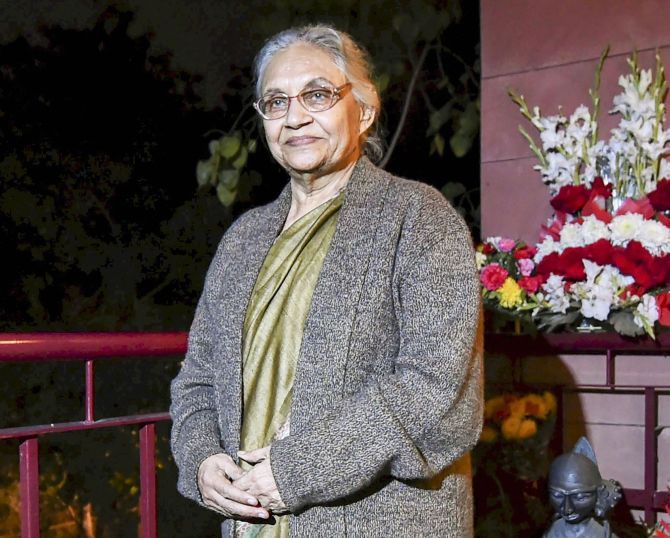In her death, the Congress has lost a leader who brought old world grace to politics but was open to new ideas.
Archis Mohan reports.

At a party meeting a few months back, Sheila Dikshit received a letter from Rahul Gandhi, requesting her to contest the 2019 Lok Sabha elections.
Dikshit had not intended to, but those in the room noticed the letter had moved her to tears.
Dikshit later told her family and friends that if Rahul wanted her to, then she would contest.
The three-term chief minister of Delhi contested from the Northeast Delhi seat -- and lost amid the Congress's dismal pan-Indian performance.
But her will to fight was strong till her last day.
She was preparing for the assembly polls in Delhi, scheduled in February next year, believing that she could repeat history.
When Dikshit led the Congress to victory as its state unit chief in December 1998, becoming the CM, barely months after losing a Lok Sabha election, few expected the affable diminutive woman to survive her malevolent rivals even in her own party.
The Bharatiya Janata Party government, which had ruled Delhi from 1993 when it got a quasi-state status, has seen three CMs.
Most expected one of the senior Delhi Congress leaders to outwit Dikshit and consign her to the list of CM with short tenures, such as Madan Lal Khurana, Sahib Singh Verma and Sushma Swaraj.
Till then, Diskhit had had an uneventful Lok Sabha tenure, having won from Kannauj in the 1984 elections.
She had served as a junior parliamentary affairs minister in the Rajiv Gandhi government.
When Dikshit -- the daughter-in-law of freedom fighter and former Union minister Uma Shankar Dikshit and widow of his IAS son -- became the CM, she was 60 years old.
She had studied in the Convent of Jesus and Mary and Miranda House.
Dikshit had the support of then Congress president Sonia Gandhi, but Rajiv Gandhi's widow was fighting her own share of battles within the party.
Over the years, Dikshit proved to be a pillar for Sonia Gandhi.
The Congress ruled only a few states in the country, Delhi being one of them.
She outmanoeuvred colleagues in the Delhi Congress, negotiated with the BJP-led government at the Centre, won the 2003 assembly polls comprehensively, and transformed Delhi into a modern city while preserving its heritage, parks and greenery.
Dikshit was a rare politician, achieving all this with immense grace.
Hailing from a Punjabi Khatri household settled in Delhi, she married into a Brahmin family of Uttar Pradesh, was one of the first to understand the demographic change that had taken place in Delhi, that it was no longer a Punjabi-Baniya city, but had come to belong equally to the large numbers of migrants from Uttar Pradesh and Bihar.
In her autobiography, Citizen Delhi: My Times, My Life, Dikshit has written about the early lessons she imbibed in straddling different worlds seamlessly and bridging divides.
In 1962, after a whirlwind romance with her future husband, 24-year-old Dikshit found herself as the new bride of the conservative Dikshit family in Lucknow with a ghoonghat (veil) pulled down to her waist.
'My liberal Kapoor upbringing combined with the experiences of a seemingly conservative Diskhit household prepared me for dealing with people from diverse backgrounds and being comfortable in all possible settings,' Dikshit wrote in the autobiography published last year.
'My experiences in both households taught me that differences can be bridged if one has the confidence and the intent to look beyond them. I also learnt that liberalism comes in many guises,' Dikshit wrote.
In 1969, Dikshit started assisting her father-in-law.
In the 1970s, she was the chairperson of the Young Women's Association and helped set up two hostels for working women in Delhi.
Dikshit's ability to bridge apparent contradictions helped her become one of the most successful CMs of her time, and a face of development across India.
There were controversies on the way, some of which she used her to her advantage, including the Supreme Court order banning polluting diesel buses.
Even the court ordered drive to seal structures that violated building laws in 2007, or her plan to introduce Bus Rapid Transit that the south Delhi elite resented, could not dent her credibility.
During her tenure, Delhi's power supply situation improved significantly after she allowed private companies to distribute power.
In 2010, Dikshit's government faced allegations for alleged irregularities in the preparations for the Commonwealth Games.
She was unseated in 2013 as the Aam Aadmi Party came to power.
In her death, the Congress has lost a leader who brought old world grace to politics but was open to new ideas.












 © 2025
© 2025